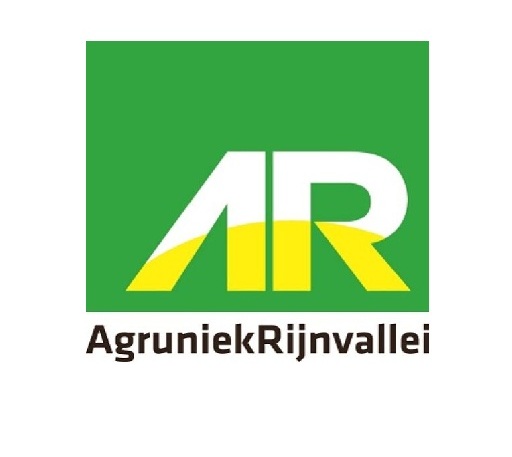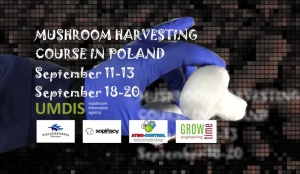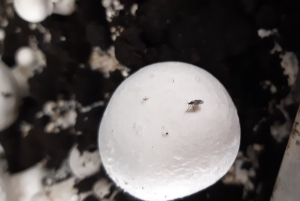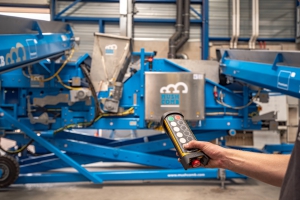
Mushroom Matter
Welcome on our platform. Why MUSHROOM MATTER? Because mushrooms play an important role in our lives as well in business. Our goal is to bring the world the very latest mushroom news with the upmost care to support the positioning of our beloved Mushroom.
Are mediocre yields and harvests not satisfying you? This mushroom harvesting course is for you
In the competitive realm of mushroom farming, achieving perfection is the key to success. However, striving for excellence in harvesting efficiency often requires guidance from seasoned experts. Don't worry; UMDIS has you covered. Its upcoming training course is tailor-made for ambitious growers like you, promising a fast track to unprecedented yields.
Mushroom harvesting course — who, when and where?
Led by the accomplished instructor, Lina Turovska, who effortlessly manages six farms across America, UMDIS' mushroom harvesting course is a three-day immersion into cutting-edge techniques for optimizing your harvesting process. Expect to learn methods that can boost your yields by an impressive 5–8 kilograms of mushrooms per square meter!
In order to accommodate various schedules, the organisers decided to organise two events, which take place later this month: one from September 11-13, 2023, conducted in both English and Polish and another from September 18-20, 2023, conducted exclusively in English.
Just like the staff and equipment, the locations have been carefully selected to provide maximum value to the participants. By signing up you’ll get the opportunity to visit Sopinscy Uprawa Pieczarek, which is the largest farm in Europe, as well as the exceptional Wierzbno Mushroom Farm.
Learn while using GROWTIME’s top-of-the-line equipment
At GROWTIME, we're passionate about advancing the mushroom growing industry. We don't just produce equipment; we share the expertise to make the most of it.
We’ve partnered with UMDIS to conduct a theoretical and practical session on the optimal operation of our modern mushroom picking trolleys. These trolleys are designed with the most demanding customers in mind, and now you can master their potential.
Ready to take your mushroom farming to the next level? Sign up today and learn from the best in the business! Visit our website to read more about the upcoming training course and to check out GROWTIME’s state-of-the-art lorries, which will be in action during the events.
Z Natural Foods is excited to unveil their latest innovation: Organic Instant 7 Mushroom Coffee (Black).
Harnessing the power of nature's best healers, Organic Instant 7 Mushroom Coffee (Black) features an all-star lineup of organic mushrooms, including Lion's Mane, Shiitake, Turkey Tail, Chaga, Cordyceps, Maitake, and Red Reishi. Each mushroom brings unique wellness attributes, from cognitive support to immune system enhancement.
"Our aim was to create a product that blends the pure taste of organic coffee with the health advantages of these extraordinary organic mushrooms," said Jonathan Parker, Director of Nutrition Science at Z Natural Foods. "We believe that nature provides the best ingredients for a balanced lifestyle, and this new Organic Mushroom Coffee exemplifies this philosophy."
Please read the full article here.
Source: PR Newswire / Z Natural Foods
Recognise, isolate and control
These three principles are the base of disease control on a mushroom farm. To my opinion there is no farm that has not a spot of disease somewhere.
But depending on what is done it will develop into a serious problem or it will stay a hidden time bomb.
If a problem is discovered it is of crucial importance that is recognised. To make sure that will happen training of people on the farm and especially pickers is needed. They are your eyes on the farm.
They need to know the most common diseases and especially in a young stage. Many places of dry bubble are not recognised and are only seen if the disease is in an almost incurable stadium. The small wart on a mushroom or grey spot is often missed.
The same goes for insects. Many growers do not know the difference between a phorid and a sciarid. Although the damage pattern is totally different, so Is the threshold where it really starts costing production. Also the cure is completely different.
Example: growers use diflubenzuron against phorids.
It is only active against sciarids.
If the disease is recognised then it should be isolated. It can be covered on the spot but the most important is to simply keep all doors closed. Check filters and door seals. If a room is infected, make sure the infection is contained in that one room and does not spread on the farm.
After the isolation the disease can be treated. If the spot is detected in an early stage one can do with just a sport treatment. If it is more the whole room should be taken on.
But too often the infection spreads and the whole farm must be treated. Generally room treatment for a full cycle with an overlap of two or three rooms to break the lifecycle of the disease.
So, just a test:
Look at the photo and spot the phorid. Or is it a sciarid?
Plant-based mushroom innovation sees the light
Growing mushrooms above ground and sprouting soybeans are two entrepreneurial efforts looking to make plant-based protein ingredients more nutritious, affordable and sustainable.
Mush Foods, Ltd., Rehovot, Israel, a portfolio company of the Strauss Group Kitchen FoodTech Hub founded in 2021, now offers a 50CUT mycelium protein ingredient system to reduce the animal protein content in meat products by 50%, said Shalom Daniel, co-founder and chief executive officer of Mush Foods. The ingredient requires no agricultural land and uses minimal energy and water, according to the company. Cultivation does not depend on season or climate.
A binder and whole protein, the mushroom mycelium needs no added binders and offers an umami flavor and a fleshy meat-like texture as well as fiber, vitamins and minerals, Mr. Daniel said.
The company so far has developed 50CUT beef and 50CUT chicken. Pilot plants will be built in the United States. Company plans are to launch sales in the first quarter of 2024.
Read the full article here.
Source: Food Business News
Fungal Disease Awareness Week
From September 18 to 22, 2023 it's the Fungal Disease Awareness Week.
Many people are affected by fungal diseases at various times in their lives. For example, inhaling mold spores can cause diseases such as histoplasmosis, blastomycosis or valley fever.
Fungal diseases are increasing worldwide. This is due to the increase in the Earth's temperature which can allow infectious fungi in the environment to grow in new areas that were previously too cold. Changes in climate can also cause fungi to evolve, threatening the emergence of new fungal infections. For example, the Candida Auris epidemic (the hospital fungal infection!) would be the first to be caused by climate change. The fungus is known for its extreme resistance, its super-fast spread and the high mortality rate of patients who become infected with it.
Of course, not all molds are poisonous, but some molds are known to be capable of producing toxins (mycotoxins). Eating or inhaling these toxins can lead to a yeast infection.
Despite all we now know about how mold causes diseases, misdiagnoses still occur and can cost lives. Also the fact that people are increasingly becoming resistant, there are only limited available antifungal medications. This means that it is more common that fungal diseases cannot be treated.
This week should ensure that the world population becomes aware of the fact that inhaling or eating mold spores can have fatal consequences.
Source: Mushroom Matter
University of Queensland researchers are working with industry to develop biodegradable ‘plastic’ bags for use in mushroom farming, which could open lucrative opportunities in packaging and manufacturing.
Dr Nasim Amiralian from UQ’s Australian Institute for Bioengineering and Nanotechnology is collaborating with Queensland producer Scenic Rim Mushrooms to reduce the company’s reliance on plastic ‘grow bags’.
“Grow bags are widely used across the fungiculture industry, but most are made from non-biodegradable materials which can only be burned or sent to landfill,” Dr Amiralian said.
Please read the full article here.
Source: The University of Queensland
As the sun's warm embrace blankets the earth, a quiet wonder emerges beneath the forest canopies, in fields, and even in our own backyards. Mushrooms, those enigmatic and diverse organisms, have their own story to tell during the summertime. From vibrant hues to hidden ecosystems, let's embark on a global adventure to explore how mushrooms flourish during this magical season.
1. Bountiful Forests of North America
In North America, the summertime brings forth a bountiful display of wild mushrooms. From the iconic morels to the majestic chanterelles, forests come alive with a myriad of shapes, colors, and flavors. Enthusiastic foragers take to the woods to harvest these gastronomic treasures, while fungi experts study their ecological roles. The diverse landscapes of the continent offer a playground for mushrooms, showcasing the symbiotic dance between these fungi and the trees they call home.
2. European Forests
Across the Atlantic, European forests present their own captivating tales of summertime mushrooms. The enchanting forests of France, for instance, are famous for their delectable truffles. Skilled truffle hunters and their faithful dogs work tirelessly, seeking the precious fungi hidden beneath the earth. Meanwhile, the United Kingdom's woodlands come alive with fairy tale-esque mushrooms, like the iconic fly agaric, adding a touch of whimsy to the landscape.
3. The Fungi Fiesta in South America
In the lush rainforests of South America, a fungi fiesta unfolds during the summer months. These tropical forests, teeming with life, harbor an incredible diversity of fungi, many of which remain undiscovered by science. These mushrooms play vital roles in the ecosystem, breaking down organic matter and supporting the balance of the rainforest.
4. The Magic of Asian Fungi
Across Asia, a rich tradition of mushroom cultivation and consumption has been practiced for centuries. From the revered shiitake to the intriguing lion's mane, Asia's mushroom culture is deeply intertwined with its culinary heritage and traditional medicine. The summertime in Asia brings forth an abundance of mushrooms, enriching the regional cuisine and adding a burst of umami flavor to dishes.
5. Hidden Gems in Australia
Even in the arid landscapes of Australia, mushrooms find a way to thrive during the summer months. Fungi like the desert truffle emerge from the sandy soil, revealing the adaptability and resilience of these organisms. In this challenging environment, mushrooms play a unique role, contributing to the delicate balance of the ecosystem.
From the mystical forests of North America to the rainforests of South America, the summertime mushroom stories from around the world reveal the incredible adaptability, diversity, and significance of these organisms. As we enjoy the warm months, let's take a moment to appreciate the hidden wonders beneath our feet - the mushrooms that quietly remind us of the magic of nature and its ceaseless cycles of life and renewal. Whether foraging for a culinary delight or simply reveling in the beauty of these fungi, the summertime offers a perfect opportunity to connect with the fascinating world of mushrooms.
Mushroom growers are known as the “ultimate recyclers” in the agriculture industry, using byproducts and waste from other sectors to make compost. Through the recycling of agricultural crops and byproducts, mushroom farms have a smaller environmental footprint than almost any other agricultural operation.
At Mush Comb, we are committed to a sustainable world. We contribute by manufacturing customized machinery. We understand that each mushroom business is unique, with its own set of needs and challenges. That's why we offer more than just standardized machinery. We have delivered machines to over 50 countries and have satisfied customers worldwide.
Our team works closely with you to design and develop machinery that seamlessly integrates into your operations, optimizing efficiency and productivity. Whether you're a small producer or a commercial operation, our customized solutions are tailored to meet your specific requirements. We provide full project consultancy, installation, maintenance, and support for our machines.
Visit our website or contact us at +31 (0)77 398 3929 or This email address is being protected from spambots. You need JavaScript enabled to view it. to learn more about our services.





























